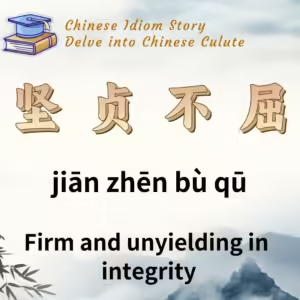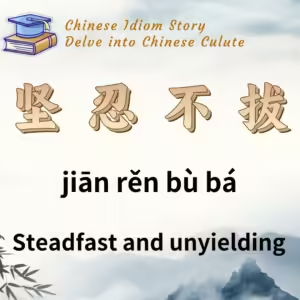
Chinese Idiom: 坚贞不屈 (Jian Zhen Bu Qu)
English Translation: Firm and unyielding in integrity
pīn yīn: jiān zhēn bù qū
Idiom Meaning: This idiom metaphorically describes a person who stands firmly by their principles and integrity, refusing to yield even in the face of death. “坚贞” (jiān zhēn) means steadfast and principled, while “屈” (qū) means to submit or yield.
Historical Source: Records of the Grand Historian (《史记·田儋列传》).
Idiom Story:
In 209 BC, during the peasant uprising at the end of the Qin Dynasty, a man named Tian Dan (田儋) from the Di people (present-day Gaoqing County, Shandong) led an uprising along with his brothers Tian Rong and Tian Heng. They killed local officials of the Qin Dynasty and restored order to the Qi region, with Tian Dan eventually becoming the king of Qi. After Tian Dan’s death, Tian Rong succeeded him as king, and later, Tian Heng supported Tian Rong’s son, Tian Guang, when Tian Rong also died.
During the conflict between Chu and Han, Tian Guang was captured by Han Xin. In response, Tian Heng declared himself king of Qi. After Liu Bang (Emperor Gao of Han) defeated Xiang Yu and unified the empire, he became emperor in Luoyang. Fearing for his life, Tian Heng fled with over five hundred soldiers to an island in the East China Sea.
Liu Bang, recognizing the potential threat posed by Tian Heng and his brothers, sent messengers to pardon Tian Heng and promised a title if he returned. Hearing this, Tian Heng and two attendants traveled towards Luoyang. However, when they were thirty miles from the city, Tian Heng used the pretext of needing to wash before seeing the emperor to stop at a post station.
There, he confided in his attendants:
“I once declared myself king alongside the Han emperor. Now, to be a captured subject and bow before him is a humiliation I cannot endure. If the emperor wishes to see me, it would be easy to execute me before I even reach him, and the distance would not hide my fate.”
Unable to bear the thought of submission, Tian Heng chose to commit suicide. Following his wishes, his attendants quickly ran to Luoyang, carrying his head and reporting his death to Liu Bang.
Upon learning of Tian Heng’s demise, Liu Bang wept and lamented:
“Ah, how remarkable it is that three brothers, originally from humble beginnings, could each become king. Is that not a testament to their virtue?”
Liu Bang ordered Tian Heng to be buried with honors befitting a king, and he appointed Tian Heng’s attendants as officers.
Later, these attendants, unable to bear the loss of their leader, dug a hole from Tian Heng’s grave into the tomb and took their own lives inside. The over five hundred people who had accompanied Tian Heng on the island also committed suicide upon hearing of his death.
This story exemplifies the essence of “坚贞不屈,” illustrating a profound commitment to integrity and honor, even at the cost of one’s life.






